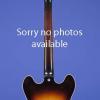"The King of the 335-Style Line"
This "king of the 335-style line" weighs 9.70 lbs. and has a nut width of just under 1 3/4 inches and a standard Gibson scale length of 24 3/4 inches. Maple/poplar/maple laminate body with one-piece maple center block, maple neck, and ebony fretboard with 22 frets and inlaid pearl block position markers. Seven-ply binding on the top, three-ply binding on the back, single-ply binding on the fretboard, and five-ply binding on the headstock. Headstock with inlaid pearl "Gibson" and "Lucille" logos and "B B King" on the truss-rod cover. "Gibson" Grover 102GK closed-back tuners with tulip-shaped metal buttons. Serial number ("90607487") and "Made in U.S.A." stamped in blind on the back of the headstock. One 490R Alnico magnet humbucker (neck pickup) with an output of 7.54k and one 490T Alnico magnet humbucker (bridge pickup) with an output of 7.64k. Tortoiseshell pickguard with five-ply (white/black/white/black/white) binding. Four controls (two volume, two tone) plus three-way selector switch and six-position Varitone switch, all on lower treble bout. Black plastic barrel-shape "Speed" knobs with white markings. Tune-O-Matic bridge and TP-6 tailpiece. Stereo and mono jack sockets. All hardware gold-plated. This guitar is in mint (9.50) condition. Housed in the original Gibson brown hardshell case with purple plush lining (9.50).
"B.B. King's powerful, lyrical, blues style has inspired generations of rock and roll guitarists. He had been playing Gibsons for more than 30 years when he and Gibson finally made the association official in 1980...B.B. recalls his first guitar as a 'little black Gibson with the f-holes in it,' an L-30 that he electrified with a DeArmond pickup. He lost it in 1949 at a club date in Twist, Arkansas, that give rise to Lucille. Two men were fighting over a woman named Lucille, and they knocked over a lit barrel of kerosene. B.B. almost lost his life trying to save his guitar from the fire, and after that he called his guitars 'Lucille' to remind himself never to be so foolish. B.B. went through many Lucilles, including an ES-5 and then a Byrdland, before settling on an ES-355. Regardless of the guitar, as long as it was a Gibson, he felt comfortable. 'There was something about the neck of it,' he says...By 1980, he was so closely identified with the ES-355 that he and Gibson got together to create a B.B. King model. His main complaint about the ES-355 had been a tendency to feed back, and he had stuffed paper inside his guitars to minimize it. The Gibson B.B. King model addressed that problem by eliminating the soundholes altogether. The TP-6 fine-tuner tailpiece was added; stereo output was achieved through two jacks rather than through the single jack and Y-cord of earlier 355s. B.B. also specified a thinner neck than the one he was playing at the time. Two B.B. King models were introduced in 1980, the Standard (rosewood fingerboard, dot inlay, chrome-plated metal parts) and the Custom (ebony fingerboard, large block, gold-plated). In 1988, the Standard was dropped and the fancier model renamed the B.B. King Lucille. It reigns today, appropriately, as the king of the 335-style line" (Walter Carter, "B.B. and Lucille," in Walter Carter's Gibson Guitars: 100 Years of an American Icon, p. 270).
Translate:

